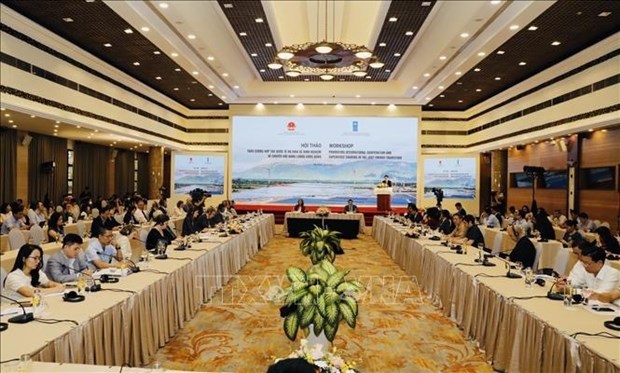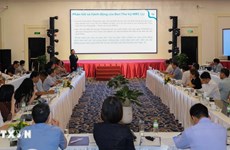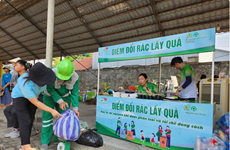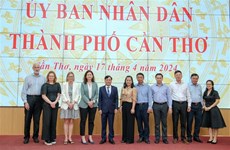Vietnam seeks further international cooperation in equitable energy transition
 The high-level event seeks to strengthen international coordination, particularly emphasising South-South collaboration in the just energy transition. (Photo: VNA)
The high-level event seeks to strengthen international coordination, particularly emphasising South-South collaboration in the just energy transition. (Photo: VNA)Hanoi (VNA) – The Ministry of
Foreign Affairs and the United Nations Development
Programme (UNDP) on May 26
hosted an international
workshop to enhance cooperation, encourage knowledge transfer, and promote
experience sharing in the just energy transition.
The
workshop convened senior government representatives
from the three countries with Just Energy Transition Partnerships (JETPs) –
South Africa, Indonesia, and Vietnam – as well as representatives from other
seven developing countries with a strong interest in the energy transition, to
create a forum for them to learn from one another.
The
workshop also brought together representatives from the International Partners
Group (IPG), the Glasgow Financial Alliance for Net Zero (GFANZ), development
partners, key Vietnamese ministries and representatives from 63 provinces, and other
stakeholders.
This
high-level event seeks to strengthen international coordination, particularly
emphasising South-South collaboration in the just energy transition.
Furthermore, it aims to promote mutual understanding on finance among diverse
stakeholders.
Addressing
the imperative of limiting the global average temperature increase to 1.5 degrees Celsius above pre-industrial levels as the Paris Agreement mandates, the workshop
emphasises the need for innovative, equitable, and sustainable approaches to
decarbonise economies and achieve climate and development objectives. The
concept of a just energy transition is recognised as a catalyst for achieving the Sustainable Development Goals (SDGs),
fostering job creation, enhancing access to clean energy, and building
resilience.
To realise the
just energy transition, developing countries require multi-faceted
international support in the form of finance, technology, knowledge, and
capacity building to effectively decarbonise their economies and establish low-carbon
development pathways.
Speaking at the
event, Do Hung Viet, Deputy Minister of Foreign Affairs, said that Vietnam is one of the countries most affected by
climate change, often hit by floods, droughts, sea level rise, and extreme weather events.
The country’s central development policy has
always been to consistently build a green, circular, and eco-friendly economy. Although
just energy transition will bring many benefits, it will also pose many
difficulties and challenges for developing countries, including Vietnam in ensuring
socioeconomic development and ensuring the interests of the state, people, and businesses.
He emphasised the need for a just energy transition. Accordingly, each country needs to
give full attention to the rights of all people and leave no one behind. Countries that have emitted a lot of greenhouse gases in the past need to
fulfil their historical responsibility, supporting developing countries in
finance, technology, and capacity building.
Energy transformation in developing
countries should have an appropriate roadmap, taking into account the
conditions and circumstances of each country.
Ramla
Khalidi, UNDP Resident Representative in Vietnam said that climate and innovative finance – both domestic and foreign, and both
private and public - is of paramount importance in the energy transition.
Governments
can create favourable conditions for private investment by putting in place
forward-looking and transparent regulatory and pricing regimes, and through
strategic public investments in essential infrastructure, she said.
The energy
transition needs to be fair and equity-driven for developing countries to
transition sustainably to low-carbon economies and establish climate-resilient
trajectories while realising their sustainable development objectives. The
energy transition must be just and inclusive for workers, local communities,
and affected people through the creation of new economic opportunities, job
creation, reskilling, capacity-building, and enhancing social safety
nets, she said./.













